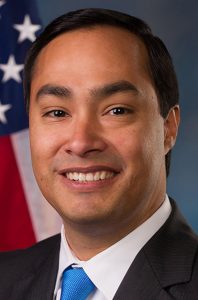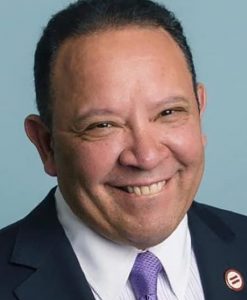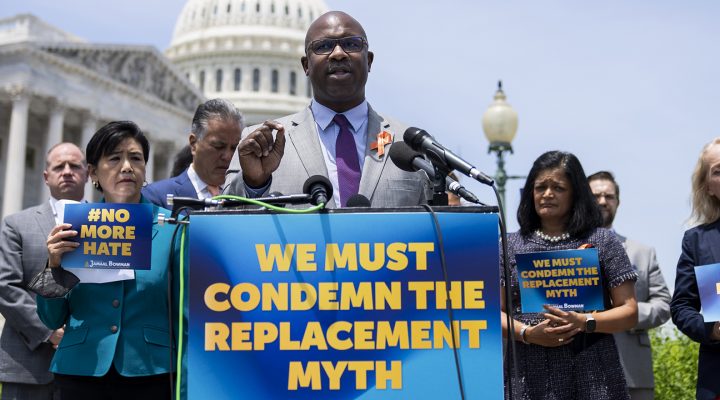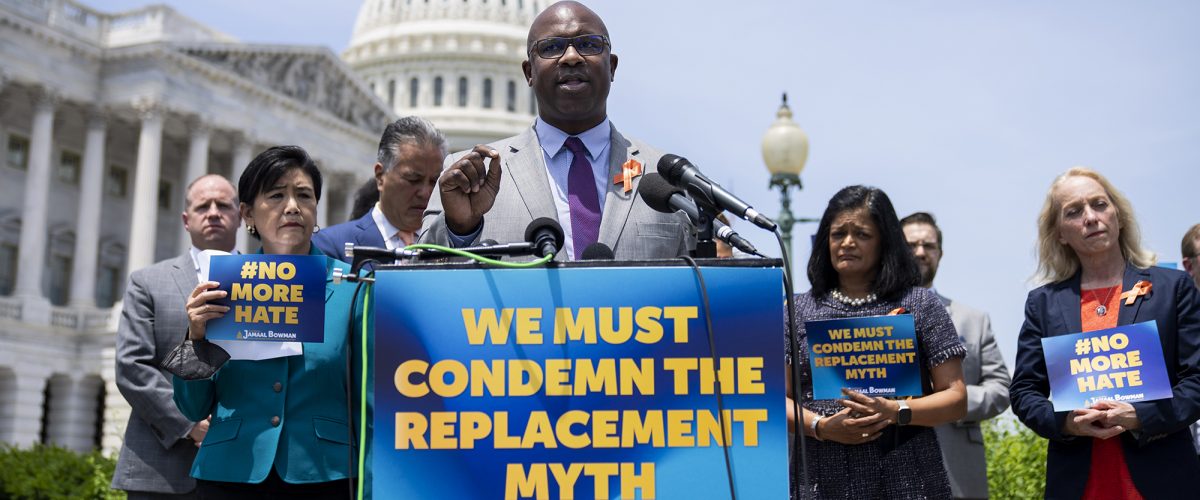More than 160 U.S. human rights and immigration advocacy groups are calling on some members of Congress to stop espousing the white supremacist rhetoric that inspired a gunman to target Hispanics in a mass shooting in El Paso on Aug. 3, 2019.
The coalition of faith-based and secular organizations issued an Aug. 1 letter urging congressional leaders to clamp down on members of the 118th Congress who are promoting belief in racist conspiracies such as the Great Replacement theory and a “Hispanic invasion,” both designed to eradicate white people in the U.S. The following day, several coalition leaders hosted a press call they hoped would pressure federal legislators and warn Americans of the violence inherent in such concepts.
“I am dumbfounded that we have to issue a call to our elected officials to unequivocally denounce white supremacist rhetoric.”
“I am dumbfounded that we have to issue a call to our elected officials to unequivocally denounce white supremacist rhetoric and ask members to refrain from using it. Our elected officials are entrusted with safeguarding the nation and its people,” said Clarissa Martinez de Castro, vice president of UnidosUS. “While we may have policy disagreements on how exactly to do that, there should be no uncertainty about condemning rhetoric that unleashes violence against members of our American community.”

Clarissa Martinez de Castro
To push that message, the groups chose the four-year anniversary of the El Paso Walmart massacre in which a 21-year-old white gunman murdered 23 people and wounded 22 others. His online manifesto extolled white supremacist ideals and, in language similar to that used by then-President Donald Trump, referred to Hispanics and other non-white immigrants as part of an invasion to overtake the nation.
They also invited Democratic U.S. Rep. Joaquin Castro of Texas to describe the challenge facing Capitol Hill from within.

Joaquin Castro
“The rhetoric we’re seeing in Congress points to a new wave of xenophobic politicians who want to take our country in a dangerous direction,” Castro said. “Since the beginning of the year, members of Congress have dehumanized and demonized migrants as ‘invaders’ and talked about an invasion at the southern border 90 times in their official capacity, in hearings on the floor or in official press releases.”
Castro said Democrats have a duty to continue pushing back against such rhetoric.
“What members of Congress say matters, and we need our party leadership to make a firm commitment to the American people that racist, homophobic and white supremacist rhetoric has no place on Capitol Hill and no place in our country,” he urged.
In March, congressional Democrats sent a letter to Republican leaders urging them to join them in condemning references to the Great Replacement theory and talking about migrants as invaders during hearings about immigration policy.

Caleb Kieffer
Caleb Kieffer, a senior research analyst with the Southern Poverty Law Center, said the situation among legislators is disturbing, especially since the 118th Congress was seated in January.
“No longer is this rhetoric only associated with extremist groups, but instead these ideas are now being amplified by elected officials, pundits and other political figures,” he said. “Words matter, especially from our leaders. So, when dozens of members of Congress repeatedly use inaccurate, inflammatory language — language that we’ve heard from white supremacists and other racists — this only serves to mainstream and normalize the language used by anti-immigrant groups and other hard-right movements to further dehumanize migrants and asylum seekers.”

Marc Morial
Evidence is plentiful that the inflammatory rhetoric leads to violence and death for people of color, said Marc Morial, president of the National Urban League.
In addition to El Paso, Morial cited the October 2018 killing of 11 worshipers at the Tree of Life synagogue in Pittsburgh and the May 2022 killing of 10 African Americans at a supermarket in Buffalo, N.Y., as instances of racist and anti-immigrant ideology in action.
“All three shooters were motivated by the same insanity and the same conspiracy, the same embrace of ‘replacement theory,’ white nationalist and white supremacist rhetoric and views.”
The killer in the Tree of Life attack was sentenced to death Aug. 2.

Marilyn Mayo
Jews are often targeted because white supremacists believe they are behind the movement of immigrants into the U.S., specifically to eliminate white Americans, said Marilyn Mayo, senior research fellow for the Anti-Defamation League’s Center on Extremism.
“When a white supremacist murdered 11 Jews worshipping at the Tree of Life synagogue in Pittsburgh, he blamed a Jewish organization for letting into the country ‘invaders that kill our people.’”
But the suffering caused by white supremacist conspiracy theories clearly goes well beyond the Jewish community, she added. “These kinds of hateful views also trickle down to more mainstream sources where pundits and media and politicians have used a milder version of the Great Replacement theory to say that America is being destroyed because immigrants from places like Latin America and the Caribbean are being allowed to settle in the U.S. where they will take the place of what they refer to as ‘real’ or ‘traditional’ Americans.”

Elizabeth Yates
The language of “invasion” is especially dangerous when used by elected officials, said Elizabeth Yates, senior researcher on antisemitism and extremism at Human Rights First.
“The word ‘invasion’ portrays migrants and asylum seekers as some kind of coordinated military force posing an existential threat to our country,” Yates said. “The increasing use of this invasion and replacement language by lawmakers, especially in the last six months of the 118th Congress, reflects the mainstreaming of the anti-immigrant, xenophobic extremism.”

Vanessa Cardenas
Vanessa Cardenas, executive director of America’s Voice Education Fund, said it is also troubling that Republican presidential candidate Mike Pence is calling for a declaration of invasion at the border. In this, he represents the many conservative voices extolling the concept.
“This is why civil rights groups, faith groups, LGBTQ groups, gun violence prevention groups and immigrant rights groups have come together to ask the leaders in both parties in Congress to show leadership,” she said. “The research and evidence are crystal clear. When elected officials amplify dangerous rhetoric like the white nationalist invasion and replacement conspiracy theories, they create a climate that fosters political violence.”
In its letter to congressional leaders, the coalition went further, labeling white supremacist violence as acts of terrorism: “Again and again, our country has experienced hate violence inspired by this conspiratorial rhetoric. We know this because terrorists tell us this in their screeds.”


